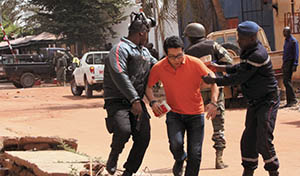

“…The evil man shall not be unpunished; but the seed of the righteous shall escape.” —Mishlei (Proverbs) 11:21 (translation from Mechon-Mamre)
As I write this, I’m thinking back to this past week. It was probably one of the tougher weeks I’ve had in a long time. And it had nothing to do with schoolwork (there was the usual amount, nothing too major) or tests (only one small history test) or college apps (this week marked the end of my break from working on them, but that’s another story). It had to do with events happening thousands of miles away from me, yet still events that saddened me more than I expected.
Last week, on Shabbos morning, I came home from youth minyan and went upstairs to say hello to my mother, and that’s when I saw the headline on the front page of The Record. My heart began to pound. “This is bad,” I told my mom as I started to read about what had happened in France. That was certainly an understatement. One hundred and thirty people killed while at cafes, concerts and the like? Hundreds injured? The entire country paralyzed by fear? The scale of it all was hard for me to comprehend. And of course, the scariest part—it was an attack that ISIS claimed to have carried out. Suddenly, the threat of ISIS seemed more real than ever, if the organization is now powerful enough to carry out attacks like this. And I have friends with connections to France (family, study abroad)—I can’t imagine what they must’ve felt when all of this happened.
That night, as I also began to hear more about what had happened in France, I also began to hear about terrorism that had happened in Beirut, Lebanon. Forty-three people were wounded and over 120 were killed by suicide bombers—and just like in the France attacks, ISIS claimed to be responsible. I don’t want to go into the debate right now over whether there’s been a double standard, that the media has been covering France more and that people have been caring less about the attack in Beirut. I think that is a serious discussion that should be had, but I also think that right now we should all just try to keep Beirut in mind and to know that it’s just as significant as everything else. (Also, when it comes to something like this, I find it irrelevant that Israel and Lebanon are technically enemies. Given that I’m not in the governments of either one, I do have the power to speak up for each one, and while my loyalties do lie with Israel, I can still care about what happens to innocent people in Lebanon.)
On Tuesday, my school hosted Israel Night, where representatives from many different yeshivot and seminaries throughout Israel came to the Ramaz Upper School to showcase their programs. I’m hoping to be able to do a gap year in Israel—I don’t know for sure if I’ll be able to, but my family and I are working on making it happen. But Ramaz’s Israel Night ended up happening at a seemingly unfavorable time. Later that week, as you may have heard, there was a spate of terror attacks in Israel carried out by Palestinian extremists, killing five people, including Ezra Schwartz, an American student at Yeshivat Ashreinu who was murdered as he was heading back to the yeshiva from a chesed outing. The horror of it all hit me on more than one level—a boy around my age… someone who a decent amount of my friends know… someone doing the very thing I hope to do next year… brutally murdered. It makes me nervous—whether that’s rational or not—for all of my friends and family in Israel. And what will this mean for my year in Israel? Right now, I still want to go for a year, but what are things going to be like by the time I’m ready to get on the plane to Ben-Gurion Airport?
On Friday, there was more terrible news: a hostage crisis in Mali. Twenty-one people were killed when gunmen (from an al-Qaeda affiliate, no less) took control of a Radisson hotel and took dozens of people captive. I have no real connection to Mali, but still—that doesn’t matter; there are still people being hurt and killed. And as I write this now on Saturday night, Belgium is on edge because of the threat of a potential terror attack. I can’t bear to think of what could happen, God forbid…
In the face of all of this, it’s hard to know what to do that’ll make me feel better. Excruciatingly hard. I can say Tehillim and give speeches and raise awareness and raise money and so on… and yet it still doesn’t feel like it’ll help. Nothing can bring back the victims of terror; nothing can fully heal the scars left on France, Lebanon, Israel, Mali and Belgium. I mean, as cliche as it sounds, I want to stay hopeful. I believe that there can be peace in the world, and that one day the world will stop hurting.
But, right now, it’s hard to think of that day. Because I can’t stop hurting.
Oren Oppenheim, 18, is a senior at Ramaz Upper School in Manhattan and lives in Fair Lawn, NJ. He spends his free time writing and reading, and hopes to become a published novelist and a journalist. You can email him at orenoppenheim@gmail.com and see his photography at facebook.com/orenphotography.
By Oren Oppenheim










